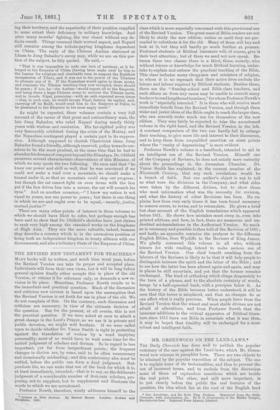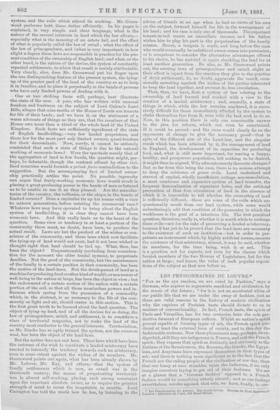MR. GREENWOOD ON THE LAND-LAWS.* THE Daily Chronicle has done
well to publish the popular suramary of the case against the Land-laws, which Mr. Green- wood now reissues in pamphlet form. There are two objects to be attained by the popular exposition of the subject. The one is to explain some of its technicalities, and thus to prevent the use of incorrect terms, and to exclude from the discussion. some of those ad captanduia assertions which are beside the real point. The other, and still more important, i/ to put clearly before the public the real features of the question, the idea which lies at the root of the English land
* Our Land-laws, and the Rua, They Produce. Noprinted from the Daily Chronicle, with Annotations, /ie. By G. G. Greenwood, of the Middle Temple. Barrister-at-Law. National Press Agency, Limited.
system, and the evils which attend its working. Mr. Green- wood performs both these duties efficiently. In his pages is explained, in very simple and clear language, what is the nature of the several interests in land which the law allows,— especially what is the meaning of an estate tail, and the effect of what is popularly called the law of entail ; what the effect of the law of primogeniture, and (what is very important) in how slight a degree these laws are responsible in practice for the pre- sent condition of the ownership of English land; and what, on the other hand, is the nature of the device, the system of constantly repeated settlements, to which that result is mainly attributable. Very clearly, also, does Mr. Greenwood put his finger upon the one distinguishing feature of the present system, the tying. up of the greater part of the land of the country so as to keep it in families, and to place it perpetually in the hands of persons who have only limited powers of dealing with it.
One or two striking facts will, perhaps, best illustrate the state of the case. A peer, who has written with unusual freedom and freshness on the subject of Lord Cairns's Land Bills, alleges that nine-tenths of the House of Lords are tenants for life of their lands ; and we have it, on the statement of a warm advocate of things as they are, that the members of that House own more than a third of the whole land Of the United Kingdom. Such facts are sufficiently significant of the state of English landholding,—very few landed proprietors, and those few for the most part only limited owners, quasi-trustees for their descendants. Now, surely, it cannot be seriously contended that such a state of things is due to the natural working of economic laws ? Were the spectacle merely that of the aggregation of land in few hands, the question might, per- baps, be debatable, though the contrast offered by other civi- lised countries would furnish a primal' facie contradiction to the suggestion. But the accompanying fact of limited owner- ship practically settles the point. No possible ingenuity can argue that freely-working economic laws would result in placing a great producing power in the hands of men so fettered as to be unable to use it as they pleased. Are the manufac- tories of the country, the collieries, or the ships, in the hands of limited owners P Does a capitalist tie up his means with a view to unborn generations, before entering the commercial race ? Whatever laws may have operated to bring about the English system of landholding, it is clear they cannot have been economic laws. And this really leads us to the heart of the question. Some view or tendency in at least a portion of the community there must, no doubt, have been, to produce the actual result. Laws are but the product of the wishes or con- science of the community, and those laws which now facilitate the tying-up of land would not exist, had it not been wished or -thought right that land should be tied up. What, then, has been the object ? Unquestionably (excluding from considera- tion for the moment the older feudal system), to perpetuate families. Not the good of the community, but the maintenance of the family in a certain position in that community, has been the motive of the land-laws. Not the development of land as a machine for producing food or other kind of wealth , or as a means of well-being to the nation at large, has been the object in view ; but the endowment of a certain section of the nation with a certain portion of the soil, so that all those numberless powers and in- fluences which spring from the possession of a commodity which, in the abstract, is as necessary to the life of the com- munity as light and air, should centre in this section. This is the first great truth to be learned about the land question. The object of tying up land, and of all the devices for so doing, the law of primogeniture, entail, and settlement, is to constitute a class of territorial magnates, not to make the land of the country most conducive to the general interests. Territorialism, as Mr. Zincke has so aptly termed the system, not the common weal, has been the object of the land-laws.
But the matter does not rest here. Those laws which have been the outcome of the wish to constitute a landed aristocracy have reacted to intensify the tendency towards such an aristocracy, even to some extent against the wishes of its members. Mr. Greenwood points out again, what has been already shown by Mr. Lefevre, Mr. Kay, and others,—that the system of family settlements which is now, as entail was in the thirteenth century, the means of perpetuating territorial- ism is almost self-working, placing such strong constraint upon the expectant absolute owner, as to require the greatest strength of mind to resist the tempt atiOn to resettle. Lord Carington has told the world how he has, by listeulng to the
advice of friends at an age when he had no views of his own on the subject, fettered himself for life in the management of his land ; and his case is only one of thousands. The expectant tenant-in-tail wants an immediate income, and his father wishes him to play his part in the perpetuation of the family estates, Hence, a bargain is made, and long before the man who would eventually be unfettered owner comes into possession, or is competent to consider the alternative advantages offered to his choice, be has assisted in again shackling the laud for at least another generation. So also, as Mr. Greenwood points out, the existing laws of primogeniture and entail, slight as their effect is (apart from the sanction they give to the practice of strict settlement), do, no doubt, aggravate the result, occa- sionally operating against the wishes of the parties interested to keep the land together, and prevent its free circulation.
Thus, then, we have, first, a system of law relating to the ownership of land framed and worked with a view to the creation of a landed aristocracy ; and, secondly, a state of things in which, while the law remains unaltered, it is exces- sively difficult for those immediately affected by the system to shake themselves free from it, even with the best wish to do so. Now, in this position there is only one conceivable answer to the plea for reform, which can even be entertained. If it could be proved—and the onus would clearly lie on the opponents of change to give the necessary proof—that in spite of the different aim of the Laud-law, and. the singular result which has been attained by it, the management of land in England, the development of its capacities for producing food, and, what is still more important, for rearing a happy, healthy, and prosperous population, left nothing to be desired, it might then be argued, Why advocate merely theoretic changes P l3ut so far from this being the case, there is no serious attempt to deny the existence of grave evils. Land undrained and starved of capital, wholly insufficient cottage accommodation, a most cumbrous and expensive system of land transfer, the frequent demoralisation of expectant heirs, and the artificial prevention of that free circulation of land in the absence of which it is impossible to tell whether the ownership of land is sufficiently diffused,—these are some of the evils which un- questionably result from our land system, while some would unhesitatingly add that condition of the peasantry in which the workhouse is the goal of a laborious life. The first practical question, therefore, really is, whether it is worth while to undergo these evils—not for the sake of preserving a landed aristocracy, because it has yet to be proved that the land-laws are necessary to the existence of such an institution—but in order to per- petuate an instrument which, by highly artificial means, ensures the existence of that aristocracy, almost, it may be said, whether its members, for the time being, wish it or not. This is a question not for experts, not even for the classes which furnish members of the two Houses of Legislature, but for the nation at large ; and hence, the value of such popular exposi- tions of the subject as that now before us.

































 Previous page
Previous page